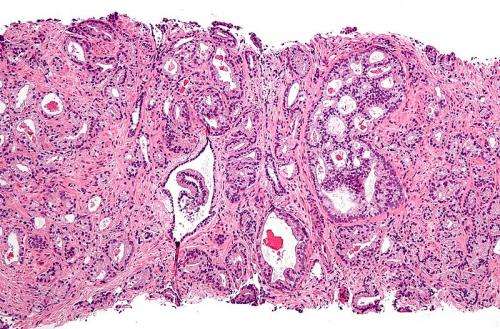Micrograph showing prostatic acinar adenocarcinoma (the most common form of prostate cancer) Credit: Wikipedia, CC BY-SA 3.0
Advanced glycation end products (AGEs), which have been linked to many chronic diseases, including diabetes, cardiovascular disease and cancer, build up in the body from birth due to normal metabolism but are often higher in those eating the high-fat, high-sugar, highly processed foods characteristic of the Western diet. AGE levels have been linked to lifestyle, such as diet and exercise, and lifestyle changes were shown in previous studies at the Medical University of South Carolina (MUSC) to drive a reduction in AGEs in breast cancer patients. AGEs may also yield insight into health care disparities. For example, black men are three times more likely to develop prostate cancer than white men and may have higher AGE levels due to low income, poor diet and obesity.
David Turner, Ph.D., assistant professor in the Department of Pathology and Laboratory Medicine at MUSC, in collaboration with Mahtabbuddin Ahmed, Ph.D., at South Carolina State University (SCSU), are co-principal investigators for a clinical trial that opened in January 2018 to determine if lifestyle changes can reduce AGEs and disease recurrence in prostate cancer survivors. Although AGEs have been studied in other chronic diseases, such as diabetes, this is among the first trials to look at AGEs in cancer survivors.
The trial aims to determine whether a decrease in AGEs through dietary and exercise intervention can improve quality of life and decrease tumor recurrence in both African American and European American patients. Funding for the trial was recently awarded to Dr. Turner and Dr. Ahmed through an NIH/NCI U54 study led by Judith Salley-Guydon, Ph.D. at SCSU and Marvella Ford, Ph.D. at MUSC.
Each institution is recruiting 60 prostate cancer survivors for a 12-week dietary and physical activity intervention based on cardiovascular disease rehabilitation. The physical activity intervention will be supervised and individualized for 12 weeks, with unsupervised follow-ups that continue throughout the year. Fitness trackers will be given to each study participant to track exercises for the entirety of the trial. Participants will complete dietary questionnaires to track diet and document how many AGEs are consumed.
To determine whether these lifestyle changes have had an effect on the immune system, biomarkers such as interleukin-6 (IL-6) and C-reactive protein (CRP) and AGE levels will be measured. Preliminary data from the breast cancer patients studied earlier show a reduction in AGEs without a change in IL-6 or CRP, which indicates AGEs could be a better biomarker of lifestyle changes than previously used biomarkers. The current trial in prostate cancer survivors will enable further analysis of AGEs as a biomarker of lifestyle.
"This could be a real landmark study, especially if it turns out that AGEs are a better biomarker than what is available," says Turner.
More information: To learn more about this and other trials at MUSC Hollings Cancer Center, call 843-792-9321.
Provided by Medical University of South Carolina




















